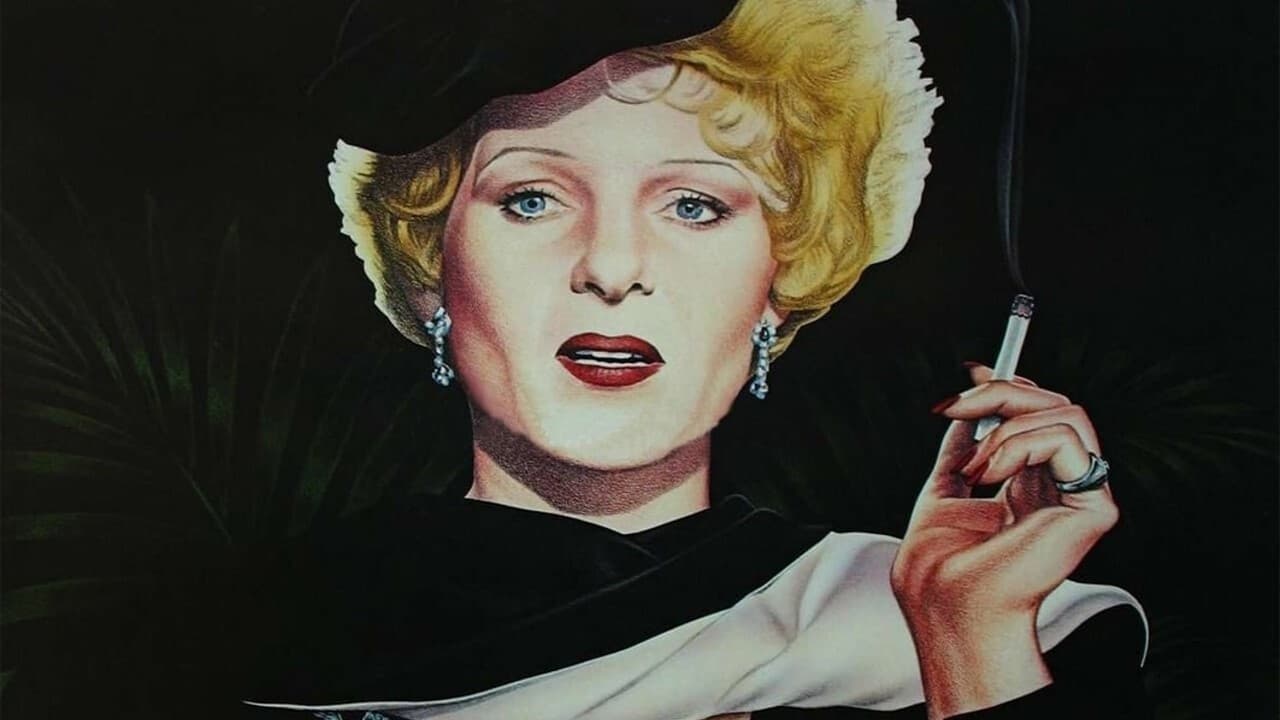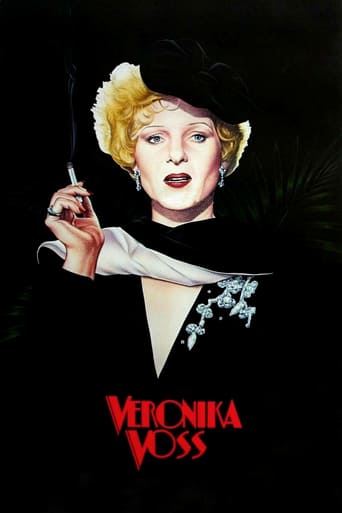

Self-important, over-dramatic, uninspired.
... View MoreA lot of perfectly good film show their cards early, establish a unique premise and let the audience explore a topic at a leisurely pace, without much in terms of surprise. this film is not one of those films.
... View MoreThis is ultimately a movie about the very bad things that can happen when we don't address our unease, when we just try to brush it off, whether that's to fit in or to preserve our self-image.
... View MoreThe storyline feels a little thin and moth-eaten in parts but this sequel is plenty of fun.
... View MoreVeronika Voss is a movie in love with movies, and also a movie where its maker, RW Fassbinder, continues on his life/career-long obsession with capturing the essence of melodrama on screen. He might have come closest with this story, since it allows him to make it a "movie-movie", so to speak. I saw some echoes, mayhap, of Sunset Blvd and even Ed Wood, and that may just be attributable to it being a true story (more or less as one would gather from this cinema "tribute" to Sybille Schmitz), but maybe too in how fascinated Fassbinder is with glamor and decadence, decay and self-absorption, the mental faculties to be caring and gentle (Robert) and with a streak that suggests the very essence of everything arguably wrong in Germans (the doctors who keep Veronika quasi-captive, hooking her onto morphine). It's a glorious, multi-faceted critique of a time and place, of a 1950s Germany that had moved on from the war only relatively - the madness could, and would, continue on in ways that involve some subtext, and some things so out in the open it's hard to stand it.It's ostensibly, in its "plot" sense, about a sports reporter for a paper, mild-mannered Robert, who on a bus one night helps shield the movie star (or once real "STAR" in quotes) Veronika Voss (very great Rosel Zech). She's interested in him, convinces him to buy her an item for $300, and he's interested too - if only for how she's not really, how to say, 'balanced', and we soon see that she is in fact under medical care of an unusual sort by Dr. Marianne Katz. That, and the involvement soon after with Robert's girlfriend in trying to figure out how to get Veronika real help, of getting the police involved as well, makes up the bulk of the rest of the story. We also get a subplot of sorts with an old couple (one look at the arm, numbers tattooed, is all that's needed to fill the pieces), but Fassbinder isn't interested in plot, per-say. He's interested in how to move it, how to transgress a simple melodrama into something more lively, profound and moving.He's also invested in creating this look for the film that is at times expressionistic of a 1930s tone, of the dark corners and streets and moments of a film-noir, and then sudden blasts of bright light thrown in (an early scene has a bunch of lights intentionally blasting at the camera lens, a perfect homage to cinema itself), with the glamor of a expensive restaurant contrasted with the white walls of Katz's quarters. Fassbinder wants us to see this as a "movie" in the sense of the usage of crafty dissolves and fades, or those wipes that are precisely artificial, but at the same time not lose sight of the drama at hand. Part of this is the acting, which is by many of Fassbinder's regulars- not least of which Armin Mueller-Stahl in a terrific, quiet but haunted supporting role as a screenwriter and ex-husband of Veroika's who says a great deal in one look to Robert down a hallway while a scene is being shot; or Günther Kaufmann, perhaps the one loose link to the previous film in the "BDR trilogy" as a G.I. who adds a curiously affecting song he sings to himself in the middle of a dramatic scene between the doctor and Veronika.Another part of this are just many, many great scenes and moments put together. Things like when the doctors start to laugh after one of them says around Veronika "It's not like we're trying to kill you," with it bordering on an Austin Powers level of absurdity, if it weren't for it being so cold a moment of satire. Or how we see Robert and Veronika contrasted, brilliantly by cinematographer Schwarzenberger, with Robert being relatively normally lit while Veronika's face gets slightly brighter with each cut-away as they talk at a table in the restaurant. Or how music is used throughout, the collection of tunes from the radio mixing with the actual score, creating a sense of illusion and madness that gets us close to the psyche of Veronika Voss while still maintaining the homage-quality of the picture. And, most notably for me, are the closing scenes, where, without revealing too much (though it may be hard in just revealing it's a melodrama at the core), Veronika dreams of a farewell party, that may be surreal enough to be a dream, but in that first moment of singing at the piano who is to say?It's such a stroke of beautiful film-making all around, from the mix of sets and real locations to the sense of history captured, of the given theme of fame being so easy to disintegrate, of the melancholic sense of cinema that bears on our lives while civilization crumbles and gets back up again. Maybe this is just what I took away from it, but it's all a credit to Fassbinder's dedication to his art form - which, soon after this, took his own life from a similar excess to that of his character here. Moreover, it's one of the superb films of its country.
... View MoreOK yes this a European film ,not a mind numb American film it has depth and layers its not ET ,its something of something of a later day Orson Wells noir B/W cinematic gem ,that echoes the 1940s but was filmed in the 80s. Voss a sort of Marlena Dietrich in the film ,she goes in and out of reality due to morphine from her keepers( a corrupt Dr)Set in 1950s Berlin( the zone) black American soldier,pop American songs on the radio. A drug induced gem of a film ,Fassbinder himself was an addict and he captures the prison of addiction in this film .The setting an aging German ex- prewar film sex symbol ,now the wars over and so is her career. shes held captive by drugs given to her in an sanitarium while the good doctor robs her blind and abuses her and others in in a blissful deranged fantasy life ,she provides in cold war Germany in the allied section .An sports reporter has a chance encounter with Voss on a train during a rain and is captivated by her sex appeal and vulnerability .he realizes the gravity of her life and the doctors evil business and the drugs .Then he tries to help her while infatuated, its black and white with high contrast glittery dream sequences, were reality becomes a dream and the starkness becomes sparkly and Voss is again a star.This movie id GREAT i certainly can not express the quality through my ramblings buy itsee itrent it steal it mike spent
... View MoreThe black & white cinematography is extremely elegant and in some scenes the light points shine as stars. Fassbinder adopts styles similar to those from the films where Veronika Voss could have acted if she existed, and leads the film to the end without much of his forced pedantism. Among the best scenes is one of the final sequences, in which Veronika dreams being again the center of the attentions (singing "Dreams are made of this"), and the continuous takes in her attempt to reestabilish her acting. Near its half, the film starts to lose the cohesion and some ways of development of the plot are wasted to arrive in a stupid and complacent ending.
... View MoreRosel Zech, who from some angles reminds us of Marlene Dietrich or Delphine Seyrig, plays Veronika Voss, a fading German movie star whose story is a European take on Sunset Boulevard. The film uses black and white photography to create effects of light, shadow, and pure luminosity that work brilliantly such as the opening scene in the tramway car, or the interior of the Dr. Katz's clinic. The scene where Veronika sings Memories Are Made Of This in a low husky voice that recalls Dietrich at her world weary best caps it all off perfectly.
... View More